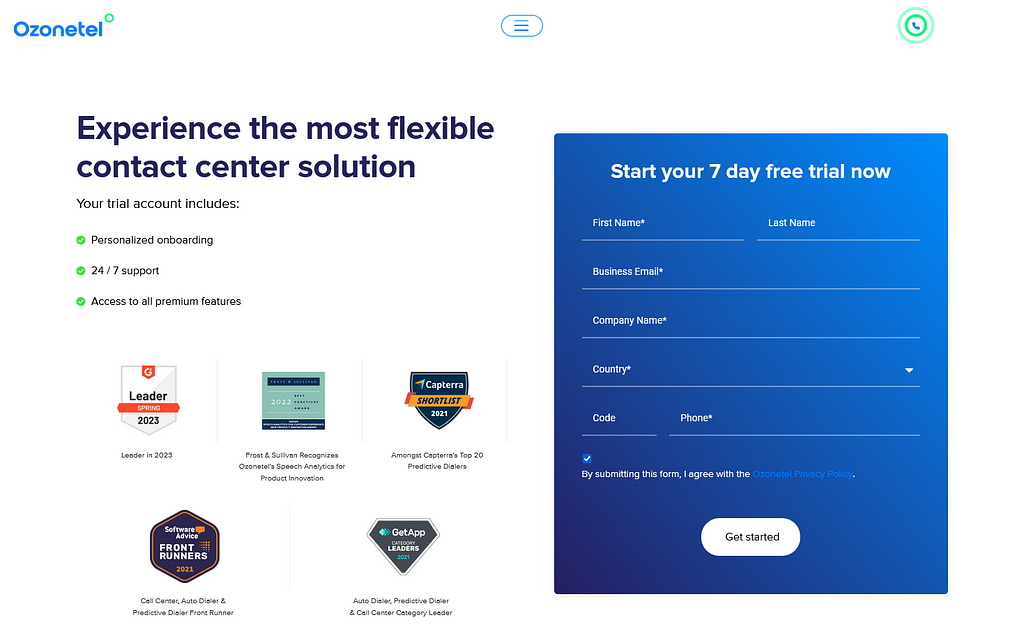- Resources
- What Is Contact Center as a Service (CCAAS)? How Does It Work?
What Is Contact Center as a Service (CCAAS)? How Does It Work?

A contact center is a vital part of any business aiming to deliver superior customer experiences. It adeptly manages various customer needs, from inquiries to support. Today’s customers demand rapid responses, hyper-personalized interactions, and proactive communication throughout their journey. Delivering a high-value customer experience is critical for sustained growth for any business. Those tied down by siloed technologies may lose out to their cloud-native counterparts.
CCaaS has become crucial for businesses as it empowers them to meet evolving customer expectations and stay competitive in an ever-changing technological landscape. Deploying a cloud solution optimizes contact center operations with enhanced scalability, flexibility, and cybersecurity. Let’s first understand what is CCaaS.
What is CCaaS?
CCaaS stands for Contact Center as a Service. It is a cloud-based solution that provides businesses a comprehensive set of tools and services to help them seamlessly manage customer interactions across multiple touchpoints and channels.
CCaaS solutions are usually hosted and managed by a third-party provider, which reduces the need for on-premise IT infrastructure, server maintenance, software updates, and security. This cloud-based approach ensures that your contact center remains up-to-date enabling your business to focus on core operations and provide superior experiences to customers.
Features of CCaaS

CCaaS solutions offer a range of features that can boost the efficiency and effectiveness of customer interactions. Following are the common features of CCaaS Solution.
Omnichannel Communication
A CCaaS solution can create a unified and seamless experience for customers, allowing them to contact businesses through their preferred channel, whether it is phone, SMS, web, mobile, chatbots, or social media. An efficient CCaas Solution also enables agents to seamlessly switch between different channels seamlessly, providng them with customer information from a single, unified platform.
Call Routing & Distribution (ACD)
Using this CCaaS feature, contact centers can route incoming calls to the most suitable agent based on factors such as skills, availability, location, and customer profile. This ensures customers are quickly connected to the right resource enabling quick resolution. CCaaS solutions also help a contact center distribute customer calls across multiple locations, teams, and time zones, ensuring optimal service levels & satisfaction.
Interactive Voice Response (IVR)
An IVR solution allows a business to automate their interaction with callers, offering them self-service options such as balance inquiry, order tracking, making payments, product information, or scheduling appointments. An IVR solution can be used to prioritize important calls, manage call queues, record calls, automate simple tasks, and collect customer information. It enables callers to navigate and route their calls efficiently, reducing wait times and improving overall satisfaction.
Call Recording and Monitoring
It’s a key CCaaS feature used by businesses to record and store customer calls for quality assurance, compliance, and training purposes. It includes tools such as real-time dashboards, reports, feedback, and gamification that can help supervisors evaluate agent performance, identify areas for improvement, and offer need-based training to enhance overall productivity.
Analytics and Reporting
Businesses leverage this feature to gain insights into their contact center performance, track key metrics, identify trends and make data-driven decisions to improve overall efficiency. The key metrics and indicators used to evaluate performance include call volume, call abandonment rate, average handle time, first call resolution, customer satisfaction, and net promoter score. This feature helps businesses customize and visualize their data using charts, graphs, and dashboards
Integration & Customization
CCaaS solutions can easily integrate with other business systems, such as CRM, CTI, ERP, to streamline workflow and enhance the overall experience. Additionally, CCaaS solutions offer businesses the flexibility to customize features, settings, and interfaces tailoring them to specific needs and preferences.
Workforce Management
CCaaS solutions also empower businesses to not only manage agent schedules, forecast demand, and allocate resources effectively but also to enhance overall operational efficiency. Workforce optimization tools within CCaaS solutions encompass performance management features, allowing supervisors to set goals, provide feedback, and conduct performance evaluations. Some CCaaS platforms integrate with quality management tools, ensuring that agents are equipped with the necessary skills to deliver exceptional customer service.
What are the Advantages of CCaaS solution
 Advantages of CCaaS Solution
Advantages of CCaaS Solution
CCaaS Solutions offer a host of advantages to a business. They simplify operations, reduce IT complexities, offer cost-effective and scalable tools, ensuring businesses stay agile and competitive. Let’s take a look at each of the advantages in detail.
Cost savings
With CCaaS, you can significantly reduce the total cost of operations and pave the way for workforce optimization. This involves eliminating upfront and ongoing expenses related to the purchase, installation, and maintenance of hardware and infrastructure. Many CCaaS solutions operate on a subscription or pay-as-you-go model, reducing upfront costs and allowing businesses to pay only for the services they use.
Flexibility and Scalability
Businesses can easily scale up or down their contact center capacity and functionality according to their changing needs and demands. With CCaaS, they can remove agents, channels, features, and locations without any hassle or downtime. CCaaS gives them the flexibility to adapt to changing call volumes and operational requirements.
Security & Compliance
CCaaS ensures the security and reliability of contact center data and operations through a host of rigorous security frameworks while supporting your compliance and digital sovereignty objectives. A robust CCaaS solutions use encryption, authentication, and backup mechanisms to protect the data from unauthorized access, loss, or corruption.
Higher Uptimes & Business Continuity
A robust CCaaS solution can effectively manage high call loads and ensure high uptimes with stellar efficiency. They offer business continuity and contingencies that reduce the risk of disruption and make it easier to recoup from a disaster. Besides, cloud-based solutions can be usedredundant and geographically distributed servers to ensure high availability of contact center services
Rapid Deployment
Cloud-based CCaaS solutions can be quickly deployed compared to traditional on-premise systems. This rapid deployment allows businesses to adapt swiftly to changing market conditions and customer demands. A robust CCaaS Solution like Ozonetel can be deployed and run within hours.
Remote Accessibility
The cloud-based nature of CCaaS provides workplace flexibility to agents allowing them to access their contact center from anywhere, anytime. Besides, remote operations make a contact centre more resilient than traditional call centers especially during outages and natural calamities
Reduced IT Dependence
CCaaS solutions, being cloud-based, offer a simpler alternative to the complex IT infrastructure of on-premise systems. With third-party hosting handling CCaaS server maintenance, software updates, and security, businesses have the advantage of focusing on their core operations without the need for extensive IT management.
Future Readiness
A cloud-native architecture allows seamless integration of new technologies to streamline communications across marketing, sales, customer service, and operations. This flexibility helps businesses stay ahead with the latest technology, and remain competitive in a rapidly changing environment.
These advantages contribute to the overall efficiency, flexibility, and competitiveness of businesses that adopt CCaaS solutions for their contact center needs.
On-premise Vs CCaaS
Here is a table that compares the main differences between cloud and on-premise contact center solutions:| Aspect | On-premise | Cloud |
|---|---|---|
| Deployment | Requires hardware and licensing setup. Is expensive and typically takes several months. | Cost-effective deployment with minimal complexities. Can be up and running in hours. |
| Location | Installed and managed by the business on its own servers and infrastructure. | Hosted on cloud servers. |
| Reliability | Dependent on the business’s own IT infrastructure and resources. | High uptime due to the provider’s redundant and geographically distributed servers. |
| Scalability | Difficult to scale as it includes additional hardware purchase and time-consuming changes. | No hardware hassles. Scaling up or down can be automated. Requires minimal technical assistance. |
| Costs | High upfront costs. Ongoing IT & maintenance costs. Recurring cost of annual upgrades. | Pay-per-use or subscription-based, with no upfront or maintenance costs. |
| Integrations | Integrations are complex. Requires custom coding or other workarounds to connect disparate systems. | Open API Platform. Integrate with any other business tool. |
| Security | Higher security risks because of onsite storage. | Data stored off-site in a secure remote location. |
| IT Support | Needs business intervention to work with vendors. | Mostly taken care of by vendors or partners. |
| Adaptability | Limited by the business’s own IT capabilities and budget. | Leveraged by the provider’s latest technologies and best practices. |
| Customer Satisfaction | Reduced by the business’s siloed, generic, and inconsistent customer service and support. | Enhanced by the provider’s omnichannel, personalized customer service and support. |
UCaaS vs CCaaS vs CPaaS
Here is a table that compares the main differences between UCaaS, CCaaS, and CPaaS solutions:
| Aspect | UCaaS | CCaaS | CPaaS |
|---|---|---|---|
| Definition | Unified communications as a service (UCaaS) is a cloud-delivery model that integrates telephonic and internet communication methods into a single unified platform. | Contact Center as a Service. A cloud-based model enabling organizations to manage customer interactions through various communication channels. | Communications Platform as a Service. A cloud-based platform enabling communication features in third-party applications and services. |
| Services Offered | Voice, video, chat, email, conferencing, file sharing, and integration with other applications. | Call routing, IVR, analytics, call recording, quality management, omnichannel communication. | APIs and SDKs for voice, video, chat, email, conferencing, messaging, and integration with other applications. |
| Primary Focus | Company-wide communication and collaboration. | Contact center operations and customer interactions. | Integrating communication into applications. |
| Features | Messaging, voice, and video calling, collaboration tools. | Omnichannel customer interactions, call monitoring, analytics, workforce management. | APIs for messaging, voice, video, and other communication features. |
| Benefits | Integrated communications, flexibility, cost-effectiveness, speed to first call. | Scalability, reliability, security, cost-effective, reduced IT dependence, High Uptimes. | Customization, innovation, agility, interoperability, scalability, security. |
| Challenges | Compatibility, security, reliability, vendor lock-in. | Integration, service quality, compliance. | Complexity, integration, security. |
How to Implement CCaaS Solution
Since CCaaS provides all the software and infrastructure needed for setting a contact center, its implementation requires a lot of planning and preparation. Business complexity makes the implementation process more challenging. Therefore, adequate preparation is required to navigate these challenges.
Here are some steps that you can follow to deploy a CCaaS solution successfully.
Assessment and Planning
Evaluate your organization’s communication needs and customer service goals. You need to have a clear vision of what you want to achieve with your CCaaS solution, and what features and functions are most important for your contact center. Accordingly, identify specific requirements, including channels of communication, scalability, and integration with existing systems
Customization
Work closely with the chosen CCaaS provider to customize the solution to match your business processes. You can use the tools and features provided by your CCaaS provider to create and customize call routing, IVR, queue management, call recording, call analytics, and other functions. You can work with your CCaaS provider to test your network bandwidth, latency, jitter, and packet loss, and identify any potential issues or bottlenecks.
Training
You need to ensure that your agents are familiar and comfortable with the CCaaS solution and can use it effectively and efficiently. You should conduct thorough training sessions for your staff to familiarize them with the new CCaaS platform. Provide ongoing support to address any questions or challenges during the transition.
Testing
Rigorously test the CCaaS solution before full deployment to identify and address any potential issues. Test various scenarios to guarantee the stability and reliability of the platform. This ensures smooth and dependable performance upon deployment.
Deployment
Gradually deploy the CCaaS solution, starting with a pilot group or specific departments. Carefully move your data and applications to the CCaaS platform using a well-organized plan. Monitor performance closely during the initial rollout and address any issues promptly. Use automation in DevOps to simplify tasks. Implement robust automation practices tailored for DevOps to streamline processes.
Monitoring and Optimization
Regularly monitor key performance metrics such as response times, customer satisfaction, and agent productivity. Use data-driven insights to optimize operations and fine-tune the CCaaS solution, providing the best possible experience for both customers and agents.
How to Choose the Right CCaaS Solution Provider for You
Choosing the right CCaaS (Contact Center as a Service) solution provider is a crucial decision for businesses seeking to offer seamless customer interactions. It will have a direct impact on the quality and efficiency of your contact center operations. However, not all CCaaS providers are the same, and you need to find the one that best suits your business needs and goals.
Alignment with Business Priorities
Before choosing a CCaas solution, you should conduct a thorough assessment of their specific requirements. You must identify the size of the contact center, the expected call volume, necessary features, and integration with existing systems. BY understanding their specific needs, they can narrow down the list of potential CCaaS solution providers to those that offer tailored solutions.
Product Mix and Capabilities
You need to ensure that the provider has the core platform features, such as call routing, IVR, queue management, call recording, etc., as well as the latest ones that allow you to remain competitive, such as AI, ML, & automation. You can refer to customer reviews, testimonials, and case studies that can provide valuable insights into the provider’s performance and reliability.
Cost and Value
CCaaS providers typically offer various pricing structures, including pay-per-use, subscription-based models, or a combination of both. You need to ensure that the CCaaS provider can offer a cost-effective and valuable solution that can deliver a positive return on investment (ROI) for your contact center.
Scalability & Flexibility
A CCaaS solution should be able to adapt to the evolving needs of the business, whether it involves scaling up due to growth or adjusting resources during fluctuations in demand. You need to check the provider’s pricing and licensing models, as well as their ability to add or remove users, features, and channels as needed.
Security and Compliance
You need to ensure that the CCaaS provider can offer a secure and compliant solution that protects your data and your customers’ privacy. Robust security measures, including encryption, access controls, and regular audits, should be in place to safeguard customer data and maintain regulatory compliance.
Implementation and Integration
You need to ensure that the CCaaS provider can offer a smooth and easy implementation process that minimizes disruption and downtime for your contact center. The chosen CCaaS solution should integrate seamlessly with existing CRM (Customer Relationship Management), ERP (Enterprise Resource Planning), and other relevant systems.
Customer Support & SLAs
Support and service-level agreements (SLAs) are essential components of a successful CCaaS deployment. Businesses should inquire about the provider’s customer support offerings, response times, and escalation procedures.
In Conclusion
To sum up, CCaaS, or Contact Center as a Service, enhances customer engagement by providing scalable, cloud-based solutions for contact center operations. With advancements in AI, analytics, and omnichannel communication, CCaaS is poised to play a pivotal role in shaping seamless and personalized customer experiences. It supports remote and hybrid work models, adapting to evolving customer needs. CCaaS represents the future of customer communication and service.
Ready to take control of your call transfer
experience for better CX outcomes?
Frequently Asked Questions
CCaaS, or Contact Center as a Service, is a cloud-based solution that provides businesses with tools to effectively manage customer interactions across channels such as voice, chat, email, and social media. CCaaS Solutions offer a range of features including call routing, analytics, and workforce management, all hosted and maintained by a third-party provider, reducing the need for on-premise infrastructure.
While CRM (Customer Relationship Management) focuses on managing customer data and relationships, CCaaS is specifically designed to enable customer communication and service through a cloud-based contact center platform. CRM software helps businesses store and organize customer data, track sales and marketing activities, and improve customer loyalty and retention. CCAaS software can integrate with CRM software to enhance customer experience and provide personalized and consistent service across channels.
CCaaS providers are companies that offer CCaaS solutions to businesses that need a cloud-based contact center platform. There are many CCaaS providers in the market, each with different features, capabilities, and pricing models. They offer scalable, cloud-based solutions with a range of features to meet diverse contact center needs, from small businesses to large enterprises.
CCaaS is crucial for businesses seeking efficient and scalable contact center operations. It reduces costs & complexity, enhances flexibility & scalability, and provides access to advanced features. CCaaS also allows businesses to adapt to changing customer needs and preferences, and to support remote and hybrid work models.
An example of CCaaS is Ozonetel, which is a cloud-based contact center platform that offers omnichannel routing, workforce optimization, AI-powered self-service, analytics, and integrations. Ozonetel enables organizations to create seamless customer experiences while benefiting from the scalability and flexibility of a cloud-based solution.
SaaS (Software as a Service) is a broad concept encompassing various cloud-based software delivery models. CCaaS falls under the umbrella of SaaS, focusing specifically on contact center functionalities delivered as a service. While SaaS includes a range of applications, CCaaS is tailored to optimize customer interactions and support contact center operations.
Prashanth Kancherla
Chief Operating Officer, Ozonetel Communications
Over the past decade, Prashanth has worked with 3000+ customer experience and contact center leaders...
Chief Operating Officer, Ozonetel Communications
Over the past decade, Prashanth has worked with 3000+ customer experience and contact center leaders to comprehensively understand the need for effective and efficient customer communications at every step of their journey with a brand. Deeply embedded in today’s CCaaS ecosystem, he has been instrumental in Ozonetel's growth and contributed in various roles including product management, sales, and solution architecture.







